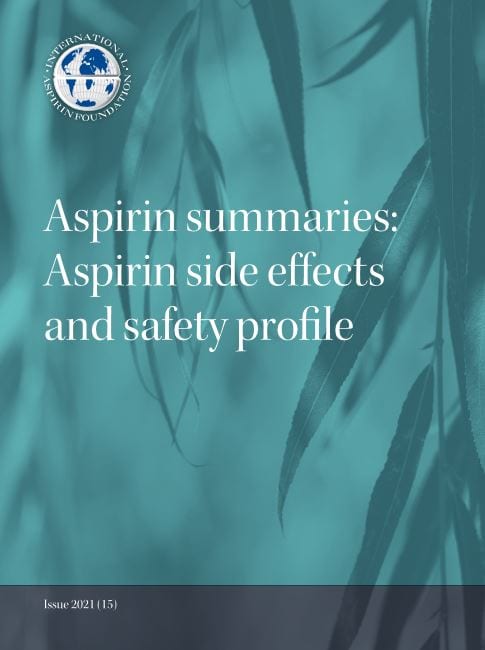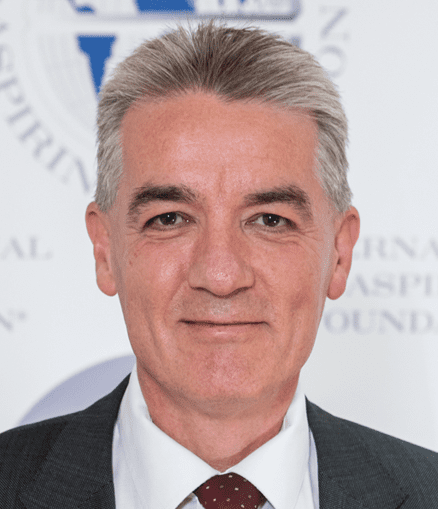Aspirin Summaries Issue 15 : Aspirin side effects and safety profile
Aspirin reduces the risk of cardiovascular disease as a result of its antiplatelet properties but by inhibiting cyclooxygenase it also reduces the production of tissue prostaglandins responsible for protecting the gastrointestinal tract which can directly cause peptic ulcer and bleeding1. Adding a second agent such as a thienopyridine (e.g. clopidogrel, ticagrelor or prasugrel) promotes bleeding because they inhibit the release of platelet-derived growth factors that help with healing of the gastric mucosa1. Thus, dual antiplatelet therapy further increases bleeding risk.
The balance of risk versus benefit has long been debated when discussing low-dose aspirin’s disease prevention abilities. Where risk of a disease event is high, for example in the secondary prevention of cardiovascular disease (CVD) or to prevent cancer incidence in those with high genetic risk such as Lynch Syndrome, the benefit of using aspirin outweighs any potential harm and guidelines recommend its use unless contraindicated 2,3.
In other areas this ‘seesaw’ equation is less easy to define. The United States Preventative Task Force have expertly calculated and described the exact set of circumstances that would lead to a balance in favour of benefit rather than risk for primary disease prevention. The USPSTF 2016 guidelines4 gave a grade B for evidence supporting low-dose aspirin taken for at least ten years for the primary prevention of cardiovascular disease and colorectal cancer in adults aged 50 to 59 years with a CVD risk score of over 10% and without any contraindications to aspirin as long as they had a life expectancy of at least 10 years. Considering the intricacies of where aspirin benefit lies and weighing this against any potential contraindications is perhaps where the true disease prevention benefits maybe realised for many patients. In other areas the balance weighs down more heavily on the side of risk, the ASPREE study identified that for those over 70 years, although low-dose aspirin was still recommended for secondary CVD prevention, for primary disease prevention the risk of a bleed outweighs any potential benefit5.
In a Medscape review of aspirin’s role in primary prevention Bhatt6 recommends that people with an ASCVD risk estimate7 over 20% are likely to benefit from low-dose aspirin. For those with an ASCVD score between 10 and 20% a coronary artery calcium (CAC) score >100 suggests a balance in favour of benefit from aspirin as long as the individual is not at higher risk of a bleeding event. Bhatt states that for those with a CVD score less than 10% the risk versus benefit of daily low- dose aspirin is less clear, and it is therefore best avoided.
In those at high risk of cardiovascular events e.g. diabetics with a high CVD risk score the benefit tends to outweigh risk and guidelines suggest considering low- dose aspirin use as well as a possible co-prescription of a PPI for gastric protection8,9.
Individualised patient informed decisions are often the answer, and this requires well informed clinicians able and willing to present the facts in a clear and informative manner for their patients [examples of tools to help this are the NICE Lynch syndrome aspirin patient decision aid]12. Patients often have a clear idea which disease prevention strategies they wish to use. The skill is being able to clearly explain this ‘pick and mix’ set of strategies in a way that is accessible and enables the individual to reduce their disease risk and enhance their health and wellbeing. Smoking cessation, weight loss, healthy diet, regular exercise, taking a statin, blood pressure control and using low-dose aspirin are all options for reducing the risk of disease – helping the individual patient understand the options is the part of the skill of the clinician.
The following aspirin summary provides some recent scientific data to help aid future research and clinical practice in greater understanding the risk benefit profile and utility of disease reduction low-dose aspirin treatment strategies.
References
1. Ayoub F and Sengupta N. Double trouble: Reducing gastrointestinal bleeding due to DAPT following acute coronary syndromes. Digestive Diseases and Sciences 2021 66:665-667. https://doi.org/10.1007/s10620-020- 06354-8
2. NICE Acute coronary syndromes: drug therapy for secondary prevention NICE pathways 2021 file:///C:/Users/ JaquiW/Downloads/acute-coronary-syndromes-secondary-prevention-and-rehabilitation-acute-coronary- syndromes-drug-therapy-for-secondary-prevention.pdf
3. NICE guideline [NG151] Colorectal cancer 29 Jan 2020 accessed 14/04/21 @ https://www.nice.org.uk/guidance/ ng151/chapter/Recommendations#prevention-of-colorectal-cancer-in-people-with-Lynch-syndrome
4. U.S. Preventative Services Task Force USPSTF. Aspirin use to prevent cardiovascular disease and colorectal cancer: Prevention Medication. April 11 2016 https://www.uspreventiveservicestaskforce.org/uspstf/ recommendation/aspirin-to-prevent-cardiovascular-disease-and-cancer
5. McNeil JJ, Woods RL, Nelson MR et al. effect of aspirin on cardiovascular events and bleeding in the healthy elderly. N Engl J Med. 2018:379:1509-1518 https://www.nejm.org/doi/full/10.1056/nejmoa1805819
6. Bhatt DL, Schuyler Jones W and Chan AT. Latest updates on aspirin in cardioprevention: Where are we today? Medscape. Posted 28/1/2021 https://www.medscape.org/viewarticle/944557
7. ASCVD risk score https://tools.acc.org/ldl/ascvd_risk_estimator/index.html#!/calulate/estimator/
8. Cosentino F, Grant PJ, Aboyans V et al. 2019 ESC guidelines on diabetes, pre-diabetes and cardiovascular diseases developed in collaboration with EASD. Eur heart J. 2020; 41:255-323. European Heart Journal, Volume 41, Issue 2, 7 January 2020, Pages 255–323, https://doi.org/10.1093/eurheartj/ehz486
9. American Diabetes Association. 10. Cardiovascular disease and risk management: standard of medical care in diabetes-2020. Diabetes Care. 2020;43(suppl 1):S111-S134 https://care.diabetesjournals.org/content/44/ Supplement_1/S125
10. NICE Lynch syndrome: Should I take aspirin to reduce my chance of getting bowel cancer? Patient decision aid. https://www.nice.org.uk/guidance/ng151/resources/patient-decision-aid-pdf-8834927869
Readmission rate in the USA for gastrointestinal bleeding following myocardial infarction.
This study is thought to be the largest to date to assess the 1- month incidence of gastrointestinal (GI) bleeding in people with acute myocardial infarction (MI) in the USA. The researchers aimed to look at in-hospital, outcomes, health care burden and predictors of GI bleeding.
Using the Nationwide Readmission Database 2010-2014 the study found that 3,520,241 patients were discharged with acute coronary syndrome (ACS) and 10,018(0.3%) returned to hospital with GI bleeding within 30 days. Gastrointestinal cancer was the most common cause of bleeding occurring in 17.3 % [1753 patients]
of those readmitted and in 9.8% [980 patients] of cases haemorrhoidal bleeding was responsible. Other causes of bleeding included arteriovenous malformations within the GI tract in 9.3% [930 patients], peptic ulcer in 8.5% [851 patients] and variceal bleeding in 0.3% [30 patients]. The mortality rate for those readmitted with a GI bleed was 3.6% [337 patients].
They found that there was a 0.3% incidence of hospitalization for GI bleeding within a month of acute MI. Lower GI bleeding was more common (60%) than upper GI bleeds (40%) and the authors suggest this may be due to increased use of proton pump inhibitors (PPIs) in order to help prevent GI bleeding.
The study found that 10.3% of patients (1031 patients) who were admitted with a GI bleed either had a past positive H.pylori infection or were found to have the infection during endoscopy performed during the readmission. The authors suggest screening for and treating people for H.pylori could offer a cost-effective solution for people starting DAPT following acute MI to help reduce the incidence of GI bleeding.
The group identified the following risk factors for readmission with gastrointestinal bleeding:
- Age – the elderly are more at risk
- Charlson comorbidity score
- Gastrointestinal cancer
- Inflammatory bowel disease
- History of chronic kidney disease
- Cirrhosis
- Having a mechanical heart valve (possibly due to the specific use of warfarin in these patients)
- Haemodynamic shock during the admission for MI
International Aspirin Foundation comments:
‘This was 337 patients out of the total 3,520,241 in the study which means less than 0.01% of the total number discharged with acute coronary syndrome died after readmission with a GI bleed.’
The authors state:
‘Further studies should evaluate the benefit of risk modification to the risk of GI bleeding in patients with a recent AMI.’
For further information please see:
Gupta K, Khan A, Kumar M et al. Readmissions rate after myocardial infarction for gastrointestinal bleeding. A national perspective. Digestive Diseases and Sciences. 2021; 66:751-759. https://doi.org/10.1007/s10620-020-06315-1https://doi.org/10.1007/s11916-020-00852-0
Reducing gastrointestinal bleeding due to DAPT after acute coronary syndrome
In an editorial in the same issue of Digestive Diseases and Science, Fares Ayoub and Neil Sengupta review studies that have looked at the incidence of GI bleeding with antithrombotic therapy, the factors that can help predict its occurrence and suitable prevention strategies. Dual antiplatelet therapy (DAPT) causes gastro intestinal (GI) bleeding in 0.6-3.9% of patients within 30 days following acute coronary syndrome (ACS). Risk factors included:
- Advancing age
- Shock
- Acute myocardial infarction
- Chronic renal insufficiency
- Lower baseline haematocrit
The authors review the guideline recommendations and evidence for proton pump inhibitor prevention and call for more work to identify modifiable risk factors for gastrointestinal bleeding with DAPT and they also suggest;
- better compliance with guidelines recommending PPI prophylaxis for those identified to be of higher risk of bleeding complications
- Screening and treatment of H. pylori
- Avoiding unnecessary NSAIDs
- Avoiding triple antithrombotic therapy when possible
For further information please see:
Ayoub F and Sengupta N. Double trouble: Reducing gastrointestinal bleeding due to DAPT following acute coronary syndromes. Digestive Diseases and Sciences 2021 66:665-667. https://doi.org/10.1007/s10620-020-06354-8
GI bleeding in the elderly – incidence and risk factors for gastrointestinal bleeding complications in the ASPREE trial
This study used data from the large randomised controlled ASPREE (ASPirin in Reducing Events in the Elderly) trial to look at bleeding risk in an exclusively older population. ASPREE assessed the impact of low-dose enteric-coated aspirin (100 mg) on disability free survival. ASPREE recruited 19,114 people living in the community who were 70 years or older (65 years or older for US minority groups). Whilst aspirin use increased the risk of gastrointestinal bleeding risk by 60% there was no increase in fatal bleeding with only 2 fatal bleeds seen in the placebo arm. The authors note that this is backed up by meta-analysis data which also shows no increased risk of fatal bleeding with aspirin primary prevention use.
Aspirin use was more likely to cause upper gastrointestinal bleeding (UGIB) with 87% of bleeds observed in the trail occurring in the upper GI tract and 36% coming from the lower gastrointestinal tract. In the upper gastrointestinal tract aspirin’s effect on bleeding is due to local factors such as reduced mucous and bicarbonate secretion as well as the reduction in systemic prostaglandin and platelet suppression.
The trial identified the following risk factors for bleeding with aspirin use:
- Increasing age (with highest risk in those 80 years and above)
- Smoking
- Hypertension
- Chronic kidney disease
- Larger waist circumference
- NSAID use
They suggest areas for future research:
- The long-term impact of bleeding on patients
- The impact of serious bleeding on survival
- The impact of serious bleeding on disability-free survival
- The impact of serious bleeding on quality of life
- The value patient’s place on bleeding events versus thrombotic events avoided
- How chronic kidney disease influences bleeding risk
The authors conclude:
“These data may assist patients and their clinicians to make informed decisions about prophylactic use of aspirin.”
For further information please see:
Mahady Se, Margolis KL, Chan A et al. Major GI bleeding in older persons using aspirin: incidence and risk factors in the ASPREE randomised controlled trial. Gut 2021;70:717-724. https://dx.doi.org/10.1136/gutjnl-2020-321585https://doi.org/10.1016/j.amjmed.2019.10.023
Bleeding risk score for planning antithrombotic therapy in patients with atrial fibrillation
People who have both atrial fibrillation (AF) and coronary artery disease (CHD) need secondary prevention of stroke with oral anticoagulation and secondary prevention of myocardial infarction and stent thrombosis with antiplatelet therapy. Around 20-30% of people with AF also have coronary artery disease making this a common clinical issue. This study investigated patients enrolled in the ARISTOTLE and RE-LY trials in order to evaluate the effectiveness of the ABC score (age, biomarkers and clinical history score) in predicting bleeding risk. Biomarkers measured from blood samples were growth differentiation factor 15, haemoglobin and troponin.
The study evaluated the ABS bleeding risk score in over 24,000 participants from ARISTOTLE and RE-LY and found that the score was able to predict different bleeding risk categories for combined anticoagulant and aspirin use. In both trials participants with a low ABC-bleeding risk score experienced a low rate of bleeding even with dual anticoagulant antiplatelet therapy. However, those with a high bleeding risk score had a higher bleeding rate and this was increased further when aspirin and oral anticoagulants were used in combination. A low annual ABC-bleeding risk of for example 0.5% without aspirin results in only a slightly higher risk of 0.8% when the anticoagulant is combined with aspirin. At high annual ABC-bleeding risk of 3.0%, with oral anticoagulant alone the addition of aspirin increases the risk at a higher rate resulting in a 5% annual bleeding risk.
The authors conclude:
“The ABC-bleeding risk score may, therefore, be a useful tool for decision support concerning intensity and duration of combination antithrombotic treatment in patients with AF and coronary artery disease.”
For further information please see:
Hijazi Z, Oldgren J, Lindbäck J et al. Evaluation of the age, biomarkers and clinical history-bleeding risk score in patients with atrial fibrillation with combined aspirin and anticoagulation therapy enrolled in the ARISTOTLE and RE-LY trials. JAMA Network Open. 2020;3(9):e2015943 doi: 10.1001/jamanetworkopen.2020.15943 https://jamanetwork.com/journals/jamanetworkopen/fullarticle/2770652
Gastroprotectants for low-dose aspirin use in individuals at high risk of bleeding – PPI more effective than H2RA
This study randomly assigned 170 low-dose (75- 325 mg) aspirin users with a previous history of gastroduodenal ulcer (proven on endoscopy) to receive either famotidine 20 mg twice daily (84 patients) or omeprazole once daily (86 patients) for 6 months. All participants had been found to have an intact gastrointestinal mucosa at endoscopy, performed for dyspepsia or other relevant complaint, at the start of the study. A follow- up endoscopy took place at the end of the study period or if the person reported epigastric discomfort, haematemesis or melena. The primary end- point for the study was gastroduodenal mucosal breaks and secondary end points were gastroduodenal ulcers and gastroduodenal bleeding.
There was a 33.8% incidence of gastroduodenal mucosal breaks in the group taking famotidine in comparison to 19.8% of those on omeprazole. There was no statistical difference in the incidence of gastric ulcers and gastric bleeding between the two treatment groups. Using a multivariant analysis the use of a PPI was found to be an independent protective factor (odds ratio:0.47; 95% CI: 0.23-0.99; p = 0.047) and smoking was found to be an independent risk factor for mucosal breaks (odds ratio:3.84; 95% CI: 1.52-9.71: p = 0.004).
The authors conclude:
“Proton pump inhibitor was superior to histamine-2 receptor antagonist in the prevention of gastroduodenal mucosal breaks in high-risk users of low-dose aspirin, and smoking was an independent risk factor for developing gastroduodenal mucosal breaks.”
For further information please see:
Tseng, Zhi-Fu; Hsu, Ping-I and Peng, Nan-Jing et al. Omeprazole vs famotidine for the prevention of gastroduodenal injury in high-risk users of low-dose aspirin: A randomized controlled trial. Journal of the Chinese Medical Association. 2021; 84;1:19-24. Doi:10.1097/JCMA.0000000000000465 https://journals.lww.com/jcma/Fulltext/2021/01000/Omeprazole_vs_famotidine_for _the _prevention_of.5.aspx
PPI use reduces the risk of upper gastrointestinal bleeding in low-dose aspirin users.
In this study UK primary care data was used to study 199,049 new low-dose (75-300 mg/day) aspirin users and match these with non-aspirin users in order to quantify the incidence of upper gastrointestinal bleeding (UGIB) and lower gastrointestinal bleeding (LGIB) events. The study looked at the impact of PPI use on bleeding risk and found that co-prescribing a PPI for more than a month resulted in a significantly reduced risk of UGIB. Short or long-term PPI use had no impact on the incidence of LGIB.
The study found that the effect of PPI use on the risk of UGIB was greater if the PPI was started with low-dose aspirin use rather than waiting for symptoms of GI problems to occur. The authors suggest that prompt co prescribing of a PPI will help to prevent GI issues, and this will help improve concordance with low-dose aspirin therapy.
The author concludes:
“ “Our results indicate that patients using low-dose aspirin who are co-prescribed a PPI have a significant 31% reduced risk of UGIB compared with those patients who discontinue PPI therapy, and do not have an increased risk of LGIB.”
For further information please see:
García Rodríguez LA, Lanas A and Soríano-Gabarró M et al. Effect of proton pump inhibitors on risks of upper and lower gastrointestinal bleeding among users of low-dose aspirin: A population-based observational study. Journal of Clinical Medicine. 2020, 9, 928: doi: 10.3390/jcm9040928 https://res.mdpi.com/d_attachment/jcm/jcm-09-00928/ article_deploy/jcm-09-00928.pdf
Disclaimers:
• The information, views and opinions expressed are not endorsed or approved bymembers ofThe Scientific Advisory Board unless otherwise stated.
• The Information section is compiled using current published information at the time of writing and whilst every effort has been made to avoid errors, professional clinical judgement is required to interpret the information given. The information given is referenced clearly for further analysis as required.
• Every effort is made by the International Aspirin Foundation to see that no misleading or inaccurate data, statement or opinion appear. The International Aspirin Foundation cannot be held responsible for any errors or for any consequences arising from the use of the information.
• The International Aspirin Foundation, its associates and The Scientific Advisory Board accept no liability whatsoever for the consequences of any such inaccurate or misleading data, information, opinion or statement.
• Any information involving drug usage, should only be followed in conjunction with the drug manufacturer’s own published literature in their own country.
• Medical sciences evolve on a continual basis and therefore independent verification of the content should be made.
• The information, views, opinions and any other material provided should not be relied upon as a substitute to professional medical advice in relation to any medical condition. The International Aspirin Foundation, its associates and The Scientific Advisory Board accept no liability whatsoever for any consequences arising from any reliance placed on such information, views, opinions and other materials in lieu of professional medical advice.












